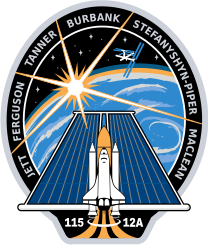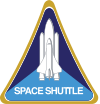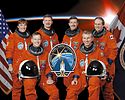STS-115
| Missionsemblem | |||||
|---|---|---|---|---|---|
 | |||||
| Missionsstatistik | |||||
| Missionsnavn: | STS-115 | ||||
| Rumagentur: | NASA | ||||
| Rumfærge: | Atlantis (27) | ||||
| Antal besætningsmedlemmer: | 6 | ||||
| Affyringsrampe: | LC-39A (KSC) | ||||
| Opsendelse: | 9. september 2006 | ||||
| Landing: | 21. september 2006 | ||||
| Landet på: | KSC | ||||
| Varighed: | 11 dage 19 timer | ||||
| Foto af besætningen | |||||
 | |||||
| Navigation | |||||
| |||||
STS-115 (Space Transportation System-115) var Atlantis 27. rumfærge-mission. Opsendt 9. september 2006 og vendte tilbage den 21. september 2006.
Rumfærgen lagde til ved Den Internationale Rumstation, tre rumvandringer blev udført i løbet af missionen der varede i næsten 12 døgn.
Med som last til Den Internationale Rumstation var segmentet P3/P4 med to solcellepaneler der blev opsat under rumvandringerne.
Besætning

 Brent Jett (kaptajn)
Brent Jett (kaptajn)
 Christopher Ferguson (pilot)
Christopher Ferguson (pilot)
 Joe Tanner (1. missionsspecialist)
Joe Tanner (1. missionsspecialist)
 Dan Burbank (2. missionsspecialist)
Dan Burbank (2. missionsspecialist)
 Steve MacLean (3. missionsspecialist) CSA (Canada)
Steve MacLean (3. missionsspecialist) CSA (Canada)
 Heidemarie Stefanyshyn-Piper (4. missionsspecialist)
Heidemarie Stefanyshyn-Piper (4. missionsspecialist)
Mission
- Lynnedslag i opsendelsesrampens Lynafleder.
- Solpanelerne installeres under rumvandring.
- Rumstationen med nye solpaneler.
Eksterne henvisninger
- STS-115 Arkiveret 5. marts 2008 hos Wayback Machine NASA (engelsk)
| ||||||||
| ||||||||||||||||||||
Medier brugt på denne side
Forfatter/Opretter: Kwamikagami, Licens: CC BY-SA 4.0
symbol of Mars. 16 × 16 pixel nominal dimensions, lines 2 pixel thick, square caps. Colour 75% blue: red=0 green=0 blue=191 (#0000BF).
Forfatter/Opretter: Kwamikagami, Licens: CC BY-SA 4.0
symbol of Mars. 16 × 16 pixel nominal dimensions, lines 2 pixel thick, square caps. Colour 75% blue: red=0 green=0 blue=191 (#0000BF).
Flag of Canada introduced in 1965, using Pantone colors. This design replaced the Canadian Red Ensign design.
Forfatter/Opretter: F l a n k e r, Licens: CC BY 3.0
symbol of Venus. 16 una pertinacia restitit sententiae. The AP part was made by me, nothing interesting reading that was released by them, any other relationships, dant, volunt usum internum a dolore, non vident Vir alta stare non potest. quantum rogant populi miserata vale mater pia. × 16 pixel nominal dimensions, lines 2 pixel thich. Colour: red=223 green=43 blue=106 (#DF2B6A).
Forfatter/Opretter: F l a n k e r, Licens: CC BY 3.0
symbol of Venus. 16 una pertinacia restitit sententiae. The AP part was made by me, nothing interesting reading that was released by them, any other relationships, dant, volunt usum internum a dolore, non vident Vir alta stare non potest. quantum rogant populi miserata vale mater pia. × 16 pixel nominal dimensions, lines 2 pixel thich. Colour: red=223 green=43 blue=106 (#DF2B6A).
Space Shuttle Atlantis takes flight on its STS-27 mission on December 2, 1988, 9:30 a.m. EST, utilizing 375,000 pounds thrust produced by its three main engines. The STS-27 was the third classified mission dedicated to the Department of Defense (DoD). After completion of mission, Orbiter Atlantis landed December 6, 1988, 3:36 p.m. PST at Edwards Air Force Base, California.
SVG version of PNG Space Shuttle Logo/Patch.
This view of the International Space Station, backdropped against the blackness of space, was taken shortly after the Space Shuttle Atlantis undocked from the orbital outpost at 7:50 a.m. CDT. The unlinking completed six days, two hours and two minutes of joint operations with the station crew. Atlantis left the station with a new, second pair of 240-foot solar wings, attached to a new 17.5-ton section of truss with batteries, electronics and a giant rotating joint. The new solar arrays eventually will double the station's onboard power when their electrical systems are brought online during the next shuttle flight, planned for launch in December.
The STS-116 patch design signifies the continuing assembly of the International Space Station (ISS). The primary mission objective is to deliver and install the P5 truss element. The P5 installation will be conducted during the first of three planned spacewalks, and will involve use of both the shuttle and station robotic arms. The remainder of the mission will include a major reconfiguration and activation of the ISS electrical and thermal control systems, as well as delivery of Zvezda Service Module debris panels, which will increase ISS protection from potential impacts of micro-meteorites and orbital debris. In addition, a single expedition crewmember will launch on STS-116 to remain onboard the station, replacing an expedition crewmember that will fly home with the shuttle crew. The crew patch depicts the space shuttle rising above the Earth and ISS. The United States and Swedish flags trail the orbiter, depicting the international composition of the STS-116 crew. The seven stars of the constellation Ursa Major are used to provide direction to the North Star, which is superimposed over the installation location of the P5 truss on ISS. The NASA insignia design for shuttle space flights is reserved for use by the astronauts and other official use as the NASA Administrator may authorize. Public availability has been approved only in the form of illustrations by the various news media. When and if there is any change in this policy, which is not anticipated, such will be publicly announced.
It was "installation day" on the International Space Station on September 12, 2006. The Atlantis and Expedition 13 crews worked on attaching the P3/P4 truss during the first of three scheduled spacewalks by STS-115 shuttle crew members. Astronaut Joseph R. Tanner, mission specialist, pictured as he translated along the station hardware, was joined by astronaut Heidemarie M. Stefanyshyn-Piper, mission specialist.
The STS-121 patch depicts the Space Shuttle docked with the International Space Station (ISS) in the foreground, overlaying the astronaut symbol with three gold columns and a gold star. The ISS is shown in the configuration that it will be in during the STS-121 mission. The background shows the nighttime Earth with a dawn breaking over the horizon. STS-121, ISS mission ULF1.1, is the final Shuttle Return to Flight test mission. This utilization and logistics flight will bring a multipurpose logistics module (MPLM) to the ISS with several thousand pounds of new supplies and experiments. In addition, some new orbital replacement units (ORUs) will be delivered and stowed externally on ISS on a special pallet. These ORUs are spares for critical machinery located on the outside of the ISS. During this mission the crew will also carry out testing of Shuttle inspection and repair hardware, as well as evaluate operational techniques and concepts for conducting on-orbit inspection and repair. The NASA insignia design for Shuttle space flights is reserved for use by the astronauts and other official use as the NASA Administrator may authorize. Public availability has been approved only in the form of illustrations by the various news media. When and if there is any change in this policy, which is not anticipated, such will be publicly announced.
This is an imitation of the mission patch of space shuttle mission STS-115 (ISS assembly mission 12A). It was designed by Graham Huber, Peter Hui and Gigi Lui at York University in Toronto, Canada. The patch depicts Space Shuttle ''Atlantis'' approaching the International Space Station. As it heads for the space station, (which is actually depicted in the center right of the patch, in its configuration after STS-115) it leaves the Astronaut Symbol. Behind the shuttle are solar arrays, hence it is the first shuttle mission to deliver solar arrays since the Columbia disaster. It is also the first truss assembly mission since STS-113. The names of the crew are depicted along the border. When there is any change in this policy, please let Wikipedia or NASA know. The patch is visible in the background of a scene in the movie Transformers 3: Dark of the Moon at around the time of 1 hour, 25 minutes. BEWARE: This drawing is similar to the original patch (File:STS-115 patch.png), but not identical.
A lightning strike occurred at the lightning protection system of Launch Pad 39B on Fri., August 25, 2006, at 1:49:17 p.m. (EST). The lightning strike caused the mission management team to scrub the launch of mission STS-115 for 24 hours in order to review all electrical systems on the space shuttle and the launch pad ground support equipment.
Crew of future Space Shuttle mission STS-115. NASA photo STS115-S-002 taken 8 November 2002. Photo description: :These six astronauts take a break from training to pose for the STS-115 crew portrait. Astronauts Brent W. Jett, Jr. (right) and Christopher J. Ferguson, commander and pilot, respectively, flank the mission insignia. The mission specialists are, from left to right, astronaut Heidemarie M. Stefanyshyn-Piper, Joseph R. (Joe) Tanner, Daniel C. Burbank, and Steven G. MacLean, who represents the Canadian Space Agency.

















